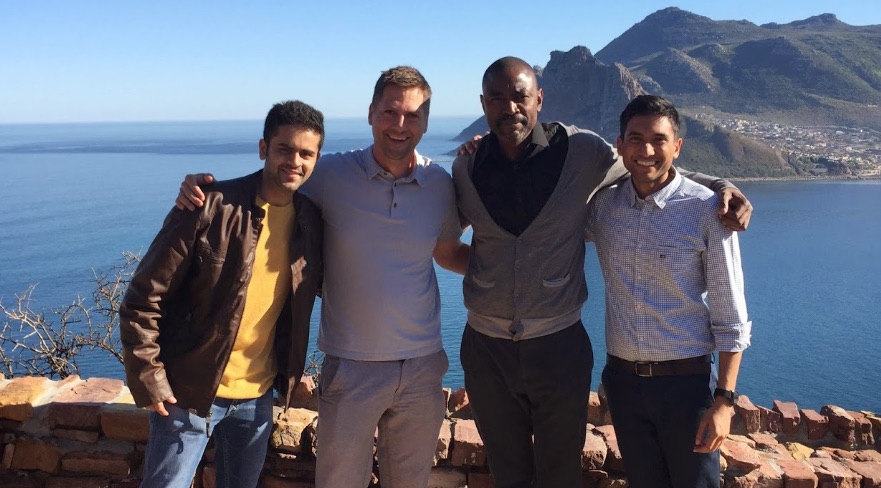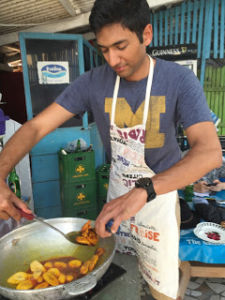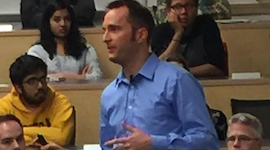With a growing middle class, early-stage frontier markets, enormous demographic advantages, and its ongoing digital transformation, Africa continues to grow in both economic and geopolitical importance. In “Demystifying Africa’s Risk Perception Premium,” Paul Clyde and co-authors make the case for a stronger U.S.- Africa trade and investment relationship, one that changes the narrative around doing business on the continent.
Building on frameworks developed in other markets, we continued working on the market analysis for a new technology to produce ammonia for fertilizer in a small-scale, distributed way using renewable energy. We have also been assisting the researchers in developing a new company that will take the product to market.
This primer provides a comprehensive but non-technical overview of the distinct health information systems (HIS) that all together support health care delivery in low-resource settings. It opens with a historical account and landscape assessment and describes the urgent need to build a lean rigorous HIS that integrates these different components. Subsequent sections describe the individual systems that: i) track individual patient and health care provider information; ii) directly document care delivery; iii) provide public and population health data; iv) support facilities’ and community health workers’ administrative and financial functions; and v) coordinate logistics and health commodities supply chains. A separate section describes imported data, including “master data” and manufactured (e.g., “meta”) data. The primer closes with recommendations for principled HIS stewardship.

Puneet Goenka, far right, with his PATH colleagues in South Africa.
Note: This is one in an ongoing series of articles profiling past WDI interns and Multidisciplinary Action Project (MAP) team members and their career paths. Additional profiles in the series may be found here.
Puneet Goenka always wanted a career in which he could improve people’s lives.
As an undergrad at the University of Michigan, he studied cell biology with an eye on the medical profession. Then he heard a talk by Partners In Health Co-founder Dr. Paul Farmer who said even though life-saving drugs were readily available around the globe, it might take years to get them to those in need. Goenka said he realized just researching a life-saving drug wasn’t enough.
After graduation, he worked for a manufacturing company in Chicago on its health, safety and sustainability team. He later moved to India for a consulting job and then founded a start-up enterprise. Throughout all these career changes, Goenka became more determined to work in the development sector.

While I knew it would serve as a useful resource, I did not realize just how helpful the Institute would be until I got to Ross and started interacting with the staff and professors associated with WDI.
—Puneet Goenka, Senior Consultant FSG
He chose U-M’s Ross School of Business for his MBA studies in part because of WDI’s student-focused programs. One of those programs, the WDI Global Impact Internship program, would help Goenka “cement his commitment” to a life working in the development sector. And when he was looking at graduate schools, WDI’s programs struck him as a great resource for MBA students.
“While I knew it would serve as a useful resource, I did not realize just how helpful the Institute would be until I got to Ross and started interacting with the staff and professors associated with WDI,” he said.
While at Ross, Goenka said that an off-campus internship search—more typical in the development sector—was challenging at first, but connections and resources provided by WDI made things easier for him, especially the summer internships offered by WDI.
“…That itself was a huge help for someone who was navigating the development sector for the first time,” he said. “I remember having a hard time narrowing down exactly which internship projects I wanted to apply to because each one was exciting. Finally, I decided to apply to projects that would allow me to work in the healthcare space—something I had wanted to do growing up but never really got the chance to—in a country that I had no prior experience in.”
Goenka worked with the Seattle-based global health nonprofit PATH to develop a market entry strategy for a low-cost medical device in three countries—South Africa, Ghana and Uganda. For his internship, Goenka researched the regulatory environment, mapped the current landscape of comparable products, studied customer needs and usage patterns, estimated demand and recommended context-appropriate pricing.
Goenka said never having worked in those three countries and never with medical devices made him both “nervous and excited.” But he learned a lot, he said. He developed a financial model by himself for the first time: “a skillset that continues to be useful to this day.” He also learned how to navigate the different business cultures in each country.

Goenka learning to cook Ghanian food.
For instance, Ghana’s business culture was “relationship-based,” where simply being polite and friendly opened doors to get interviews with relevant stakeholders at national hospitals. Uganda was more process-driven, he said, and required formal letters in order to meet with officials. Goenka would later be sent to Uganda for his current job and said his experience there as an intern gave him more confidence in conducting research this time around.
“The internship with PATH cemented my commitment to developing a full-time career in the development sector,” he said. “The work was challenging; I was working alongside driven and smart colleagues and the impact potential of the work was high. These were all important factors for me and I saw them coming alive while at PATH, which gave me confidence that I would enjoy working in the development sector.”
Goenka now leads case teams as a senior consultant for FSG in India. FSG is a consulting company that finds business solutions to social challenges. After working on an early education project for nearly two years, he is currently working on a project in Uganda to provide households with better sanitation facilities. But instead of just building and providing toilets for free, his project looks to stimulate the market so households can invest in and buy their own toilets, and the private sector is better equipped to provide customer-appropriate toilets.
“This work is a perfect way for me to blend my business training and experience with my interest in the development sector,” he said.
For now, Goenka is content working and living in India, but is open to moving elsewhere if the right opportunity came along.
“I’ve been fortunate to have worked in the U.S., India, and a little in South Africa, Ghana, and Uganda—thanks to PATH and WDI—and that makes me feel better equipped to work in new and unfamiliar geographies and contexts,” he said. “However, irrespective of geography and sector, I am quite sure that I will continue to work in the development sector, trying to improve people’s lives.”
As the academic year comes to a close, the 13 MAP teams organized and funded by WDI have finished their projects and successfully delivered final reports to their sponsoring organizations.
Multidisciplinary Action Projects, or MAP for short, is an annual, action-based learning course offered at the Ross School of Business in which MBA students work on projects for organizations all over the world under the guidance of faculty advisors. Each project requires analytical rigor, critical thinking, and teamwork among students. Sponsoring organizations receive first-rate deliverables and data-driven recommendations from the teams of students. (Learn more about this year’s MAP projects organized by WDI here; find more information on WDI’s MAP projects over the years here.)
After learning about their projects and conducting secondary research for several weeks, the students then spend two to four weeks working with their organizations in the field.
Two of those projects – in Hanoi, Vietnam and Madurai, India – focused on laying the groundwork for centers designed to support local entrepreneurs and are part of a joint effort between WDI and the Zell Lurie Institute (ZLI). To assist the students on their projects, WDI Education Initiative Vice President Amy Gillett and Program Coordinator Nathan Rauh-Bieri provided advice and guidance based on WDI’s prior work in entrepreneurship development (see WDI’s newly-launched Entrepreneurship Development Center).
Here is a recap of the two projects.
The Vietnam Partners MAP project was co-funded by ZLI, and hosted by Vietnam Partners, LLC. The project’s goal was to create a launch plan for an entrepreneurship service center in partnership with Hanoi Business School (HSB). The student team conducted more than 45 interviews with entrepreneurs, HSB administrators, and other stakeholders. They discovered that Vietnam’s entrepreneurs need help growing their business – not just starting them – and would welcome an entrepreneurship development center.
“The environment in Vietnam is ripe for this kind of organization,” said Bradley LaLonde, the team’s supervisor at Vietnam Partners.
At the end of their project, the students presented a business plan for a Center for Entrepreneurship and Innovation at HSB. The team identified a local hunger for practical rather than theoretical training, and training customized to the local ecosystem. More specifically, the MAP team identified a lack of local business cases. After a conversation with WDI, the MAP team suggested that a sustained effort around creating local cases, similar to WDI’s Philippines Case Collection, could be high-potential way to train Hanoi’s practice-hungry entrepreneurs.
Team member Juan Recalde said the project taught him that entrepreneurs have different needs.
“That was a very important learning because we could segment different types of entrepreneurs and based on the segmentation, determine which segment to target,” he said.
Recalde said he will take what he learned – specifically market research and creating a launch strategy for an entrepreneurship development center – and try to replicate it in his hometown.
“Formosa is one of the poorest provinces of Argentina and the government plays a big role in the economy, while the private sector is small,” he said. “I believe that entrepreneurship is the answer to the growth issues that my province faces.”
Stewart Thornhill, executive director of ZLI and the team’s academic advisor, praised the team for how well they represented U-M, WDI and ZLI and for their mature analysis of the project.
“They didn’t treat entrepreneurs as a generic class, but were able to identify specific personas,” he said. “Their in-depth qualitative research will serve this center’s clients well in the future.”
WDI President Paul Clyde, who also advised the team, said they gave Vietnam Partners good insights into the current situation with the country’s entrepreneurs.
“There is no substitute for having information from people who have spent time on the ground to get a good feel for what is going on,” Clyde said. “This is exactly the type of situation in which MAP projects are effective tools for us and for sponsors.”
The MAP team, based in Madurai, India, was tasked with setting up a business model for Aparajitha Foundation to provide services to the city’s Madurai’s micro, small, and medium enterprises – or MSMEs. This work builds on last year’s MAP project with Aparajitha.
The student team’s final report outlined the gaps in the entrepreneurial ecosystem in Madurai, the market opportunity, business model, financial model, implementation plan, and key learnings. The team recommended that GROW, a conceptual organization to meet the needs of growth-stage entrepreneurs, be launched. The students also provided an outline of what was needed to have GROW operating within two years and expand to a second locale within five years.
Clyde, the team’s academic advisor, lauded the students’ efforts.
“They were able to get up to speed quickly on the current situation and combined that with some careful thinking about different models for providing services to entrepreneurs,” he said. Aparajitha “has already made significant progress in (its) engagement with the entrepreneurs in Tamil Nadu.”
The project left a definite impression on team member Nancy McDermott, who, though having a background in the community development aspects of business, experienced “what a big impact supporting entrepreneurs locally has on the local economy.”
Particularly, the project’s scope exposed her to how entrepreneurship can “spark job creation at a grassroots level,” she said, adding that she saw “what a big impact this is having on Madurai’s economy, and what kind of impact it can have on other economies as well.”
This summer, a WDI intern will pick up where the student MAP team left off and develop diagnostic tools that will identify the challenges a given entrepreneur faces and thus how GROW can work with the entrepreneur most effectively.
The co-founder of a start-up venture in South Africa that aims to save the honey bee will share how he designed the initiative to have economic, social and environmental impact as part of the WDI Global Impact Speaker Series. The talk begins at 5 p.m., Nov. 16 in room R2230 at the Ross School of Business, and is free and open to the public.
(Click here to watch Madison Ayer’s Nov. 16 classroom presentation.)

Madison Ayer, who has led several social ventures in Africa, including Honey Care Africa and Farm Shop, will discuss what he learned from those enterprises to launch Mbuyu Group, a large-scale honey bee conservation initiative. Mbuyu Group is working with South African National Parks to protect some of the world’s most critical honey bee ecosystems and strengthen the bee population. The group also hopes to become one of the largest global producers of organic honey.
Ayer has been featured in the WDI speaker series in the past. Last year, he talked about Honey Care Africa and Farm Shop, two ventures in Kenya that serve those living at the base of the pyramid.
Honey Care Africa provides smallholder farmers with beehives and harvest management services. In addition, it guarantees a market for the beekeeper’s honey at fair trade prices, helping to provide a steady, consistent source of income.
Farm Shop recruits and trains franchisees who then independently operate community-level, agro-dealer shops that supply smallholder farmers with seeds, fertilizers, tools, veterinary medicines and other items to improve crop yields.
In his 2015 talk, Ayer discussed the challenges that come with integrating low-income producers and consumers into the supply chain, including poor infrastructure, security concerns, informal regulations, and high costs. But if successful in overcoming these hurdles, Ayer said it can lead to long-term competitive advantage and positive economic impact on communities across the supply chain.
Watch Ayer’s 2015 presentation here and his interview with WDI Senior Research Fellow Ted London below:
In addition to his previous talks, Ayer also has engaged with WDI’s Scaling Impact Initiative and the Performance Measurement Initiative (PMI).
As part of a project funded by the German development agency GIZ, WDI studied the landscape of BoP facilitators in the sub-Saharan Africa region. The Scaling Impact initiative conducted field visits to Ethiopia and Kenya – including to Honey Care Africa and Farm Shop.
WDI’s Performance Measurement Initiative team also conducted a qualitative impact assessment in 2012 to identify Honey Care’s impact in alleviating poverty on children age eight years and younger, and developed a case study as part of the series entitled Focusing on the Next Generation: An Exploration of Enterprise Poverty Impacts on Children. The goal of the series, funded by the Bernard Van Leer Foundation, was to gain a greater understanding of the ways in which businesses in emerging markets impact young children’s lives and the potential to optimize impact on children.
Additionally, WDI Publishing also produced a popular teaching case study on Honey Care Africa that examined the business’s transition from obligating farmers to maintain their own hives to providing hive management services. The case also explored ways to enhance this new model, including strategies to reduce side selling. It was written by London and Heather Esper, senior program manager of PMI.
As part of his continuing series, Nathan Rauh-Bieri checks back in with participants in the year-long Vital Voices GROW Fellowship. In a world growing more “virtual” by the day, he learned there’s still plenty of value in entrepreneurs meeting face to face.